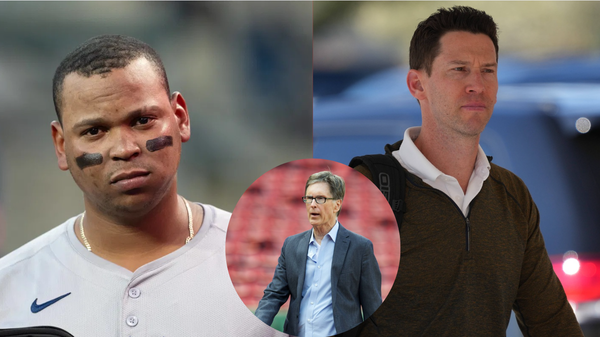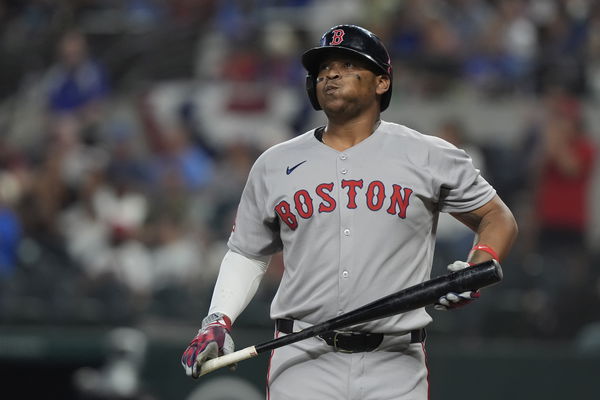

When the Boston Red Sox start flying in ownership mid-series, you know it’s not just a lineup issue—it’s a leadership crisis. What began as a routine roster adjustment has now dragged Craig Breslow into the spotlight and forced John Henry into mediator mode. Somewhere between the dugout and the front office, communication broke down—and Rafael Devers isn’t letting it slide without taking a swing of his own.
Watch What’s Trending Now!
This thing with Devers has blown into enormous proportions. It is no more between the player and the coaching staff, now it is between Devers and the Red Sox Management. After the disagreement with the CBO of the Red Sox, Breslow, over his playing first base, things are getting worse. As per reports, Principal owner Henry flew to Kansas City to meet with Devers, joined by Breslow and team president Sam Kennedy.
After the meeting, Breslow gave an interview and said, “Felt like it was important, based on the situation that unfolded [Thursday], to come out here and have an honest conversation about what we value as an organization, what we believe is important to the Boston Red Sox, that being great teammates for each other.”

The actual meeting took place between Henry, Devers, and manager Alex Cora in the visiting manager’s office at Kauffman Stadium. Breslow acknowledged the miscommunication and frustration by Devers but also said that it raised a few questions about team values. Cora called it “productive,” saying it meant a lot to have everyone in the same room. It wasn’t just about the front office or the coaches. It was about the players, and especially Raffy. You could tell they were trying to get on the same page.
Devers didn’t say much afterward. He headed straight to batting practice, focused and ready. When the lineup was announced, he was in as the designated hitter. On the field, he went 1-for-5 with an RBI in a tough 12-inning loss to the Royals. No grand statements, just business as usual.
In short, what started as a position shuffle has turned into a front-office power play. When the team owner has to fly in mid-season to settle a turf war between his star player and baseball ops, it’s no longer just about first base. It’s about first principles. The Red Sox say they value communication and teamwork; Devers just wants a consistent glove and some respect. If this is how Boston handles “internal matters,” maybe the next call-up should be a crisis manager, not a corner infielder.
Flexibility has a limit, and Rafael Devers says the Red Sox are pushing it
The Red Sox may have misread the fine print on loyalty and flexibility—turns out, it’s not a lifetime subscription. After a season of reshuffling and “strategic vision,” their go-to solution has finally hit a wall. And that wall’s name is Devers. The infielder isn’t just drawing a line in the dirt—he’s carving it with a bat, and he’s got receipts to back it up.
The Red Sox’s handling of Devers has been inconsistent, leaving him frustrated. Despite the team’s request to move him to first base following Triston Casas’ injury, Devers has repeatedly expressed his discomfort with switching positions. He voiced, “They told me I was going to play this position, DH.”
Devers’ reluctance stems from broken promises and previous position changes. In spring training, he was assured a stable role as a designated hitter. Now, the team is asking him to shift again, leading him to feel betrayed. He argues, “I don’t feel they stayed true to their word.” This ongoing uncertainty has left Devers feeling like an afterthought in the team’s plans. He believes the Red Sox are pushing him to be a backup, willing to move him around at will. “They should do their jobs and hit the market,” Devers said, suggesting they find a permanent solution.
With Devers standing his ground, it’s clear that the Red Sox’s flexibility has limits. And they’ve pushed him to the edge. While team dynamics might evolve, this saga reveals the price of broken promises and constant repositioning. Maybe it’s time for the Red Sox to realize that loyalty isn’t a one-way street. After all, even a bat has a breaking point.

